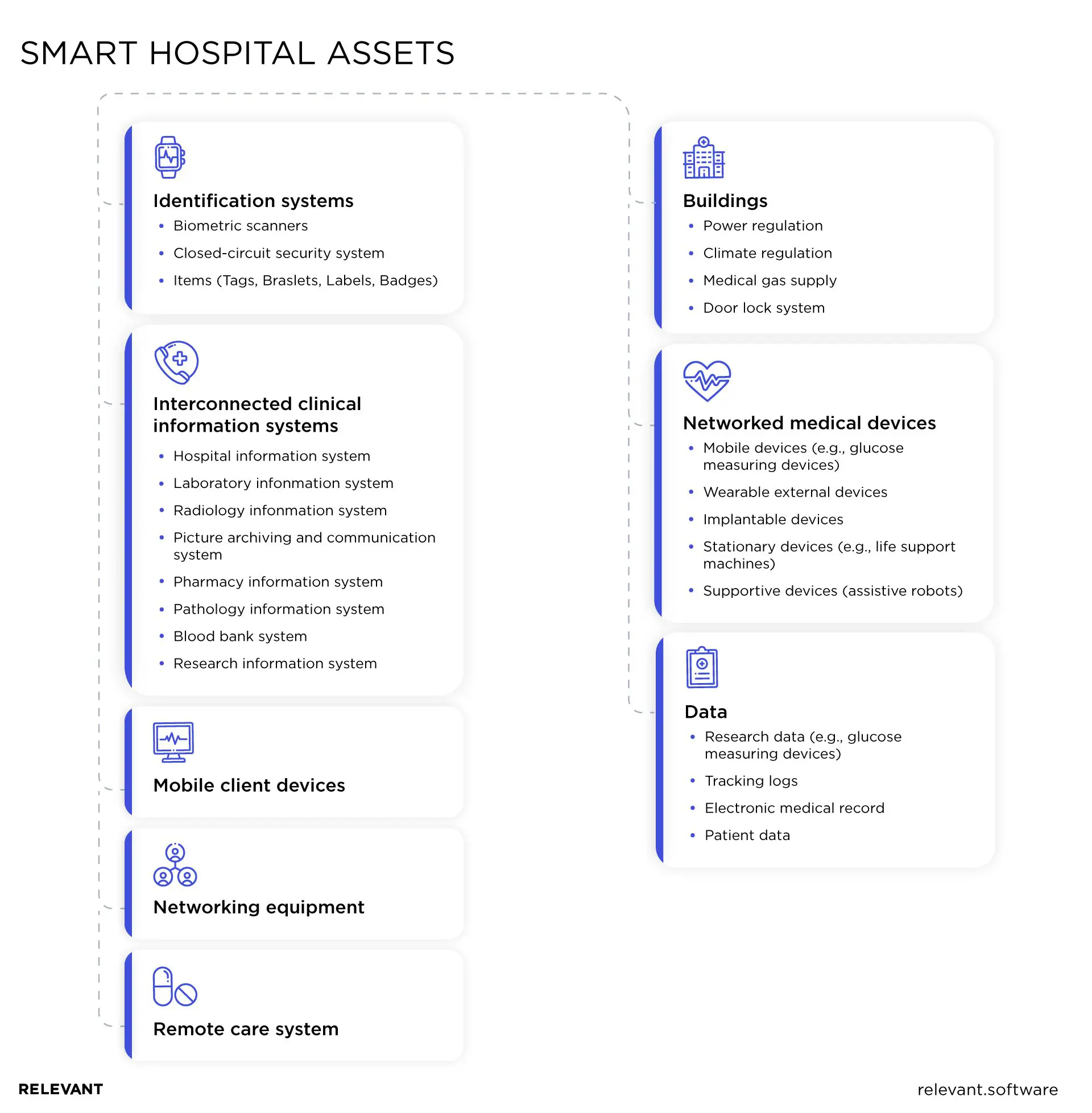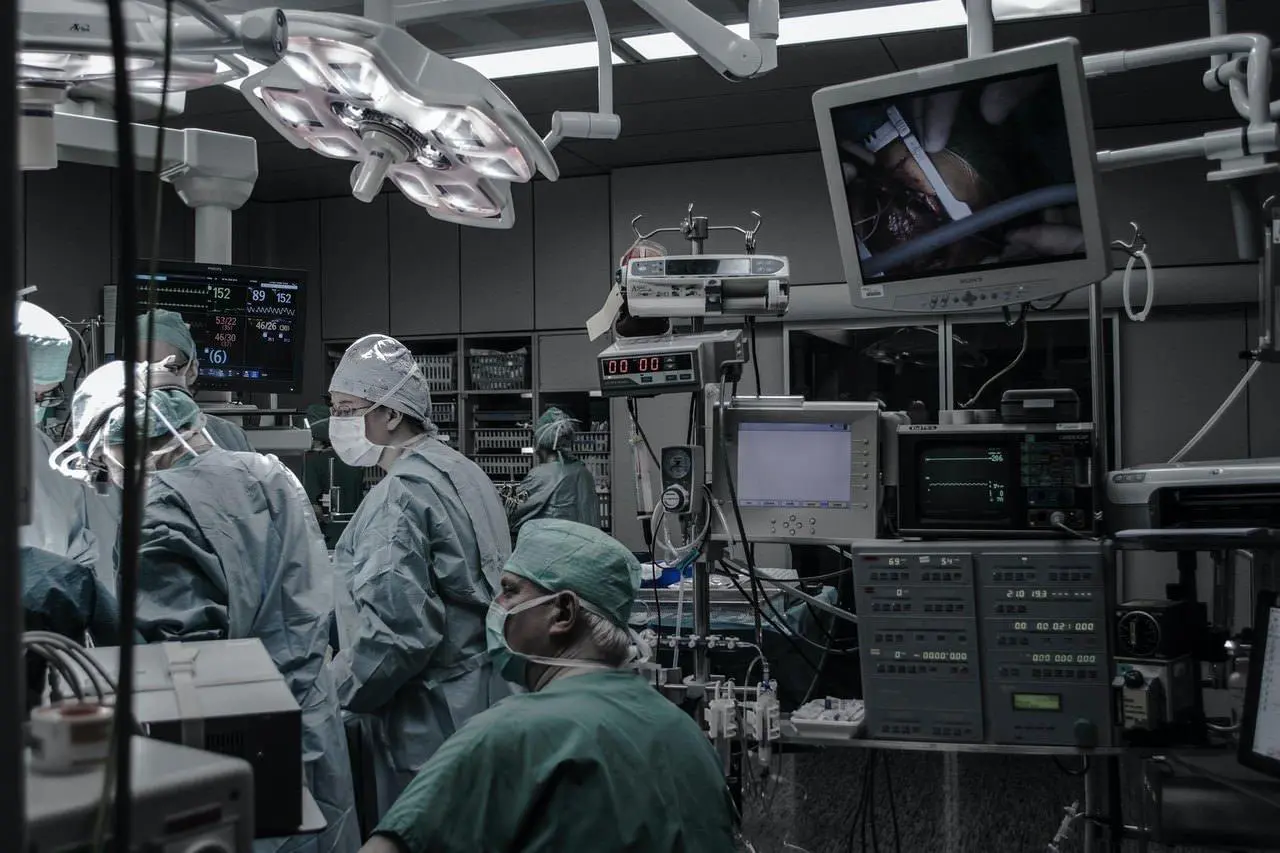How to Transform Your Hospital into a Smart Hospital

In today’s era of digital transformation, more and more decision-makers and organizations are investing in innovative healthcare technologies.
Venture capital funding for digital health solutions in the US, for example, has grown exponentially, from nearly $1 billion in 2011 to more than $8 billion in 2018. Medical IoT (IoMT) solutions market is expected to reach $142.45 billion by 2026.
from 25 countries outsourced software development to Relevant
We provide companies with senior tech talent and product development expertise to build world-class software.
Many of the technologies that allow hospitals to become more efficient and solve specific challenges define the so-called “smart hospital.”
In this article, we’ll explain the concept of a smart hospital and detail some of the benefits of turning your hospital into a “smart” one.

What Is a ‘Smart’ Hospital?
In short, a smart hospital is one based on a highly automated and optimized environment. Employing Internet of Things technology is at the heart of a smart hospital.
What distinguishes a smart hospital from a legacy hospital is that it employs a network of connected smart devices that increase the efficiency of the healthcare system and ultimately improve patient care.
Ideally, a smart hospital is a unified working organism that allows medical personnel to provide patients with advanced care in a cost-effective manner with a low error rate.
Now, let’s look at the main benefits enjoyed by a smart hospital.
Benefits of ‘Smart’ Transformation
Some major plusses:
Improved patient engagement
Placing special smart screens in rooms, for example, allows patients and their families to monitor their health status and the most important health metrics. That allows patients to be more closely involved in their treatment and improves their patient experience.
Improved diagnostics
Using smart hospital technology, doctors can use improved data to help them make correct diagnoses or choose the best treatment options, while software can automate the most complex workflows.
In a smart hospital, you can not only implement innovative technologies in the work of your team but also make legacy diagnostic methods more effective.
Optimized workflows
In terms of service and overall performance, mobile technology and the Internet of Things can increase the efficiency of the team and provide effective tools to track and fix problem areas in the work process.
Leveraging data analytics
Given that numerous devices collect huge amounts of biometric data, you can use this data to learn more about your patients, their behavior and their well-being.
In the future, you can use such information in the work of your team to make their operations more effective and patients more satisfied.
Providing patients with remote medical care
Using smart devices, you can track the status of your patients even outside your hospital, which will allow you to establish remote medical monitoring.

For example, the system may notice that your patient has experienced a sharp increase in blood pressure and can notify his or her doctor. The doctor can then contact the patient and offer recommendations.
Enhanced patient safety
Using real-time analysis of biometric data can save the lives of your patients, for example those connected to life support machines.

If the system notes that the patient is in critical condition, it will notify the nearest medical staff to come to the rescue.
Now, let’s discuss what exactly you can do to make your hospital smart.
Making Your Hospital ‘Smart’
Some examples:
1. Implement networked medical devices
Obviously, a network of connected devices is the circulatory system of any smart hospital.
As mentioned above, mobile devices (such as glucose measuring devices) and wearables (e.g. wireless temperature monitors) can be combined into a single network to collect biometric data, monitor patients remotely, improve management and much more.
[rws-cta id=”6922″]
2. Implement Big Data
Neural networks can help in the diagnosis process, based on analyzing an array of data that will help reduce the risk of human error.
Data can help predict the course of many diseases, which can reduce the risk of developing new complications and reduce the burden on your healthcare system.
Strategic use of data can also help streamline workflows. For example, analyzing hospital records can help you improve your operating room schedule and make team members more organized and productive.
3. Implement robotic surgery
Robotic-assisted surgery allows for carrying out hundreds of successful procedures that will make your teamwork more efficient and improve outcomes for your patients.

Many hospitals today are using robotics to treat issues such as uterine fibroids, prostate cancer, heart disease, and more.
4. Improve preventive health management
Using smart hospital technology and developing programs to analyze and treat chronic diseases will assist with prevention, making the healthcare system overall for efficient and effective.
From a long-term perspective, this also reduces your team’s workload.
5. Improve chronic care management
Wearable devices can help monitor the status of your chronic patients (for example, people with diabetes or high blood pressure), by allowing you to collect biometric data and effectively treat them even at a distance.

Wrapup
One of the best ways to make your hospital more efficient and effective is to transform it into a smart hospital.
Using a network of wearable and mobile devices, as well as IoMT technology, you can increase the productivity of staff, improve patient engagement, improve the accuracy of diagnostics, and optimize workflows.
Here are just some of the major ways to make your hospital smarter:
- Implement a unified network of wearables, mobile and medical devices
- Implement Big Data solutions
- Implement robotic surgery assistants
- Develop remote patient monitoring software
- Enhance preventive health management
- Enhance chronic care management
- And more…
If you want to know more about making your hospital “smart” or if you want to hire professional IoT developers, feel free to contact us.


Hand-selected developers to fit your needs at scale! Let’s build a first-class custom product together.

